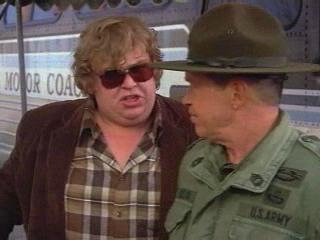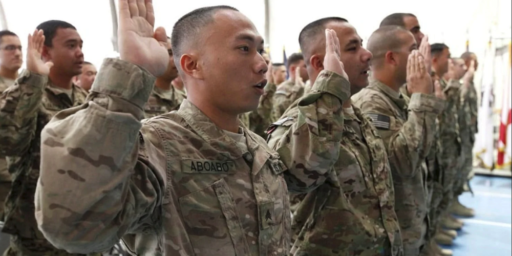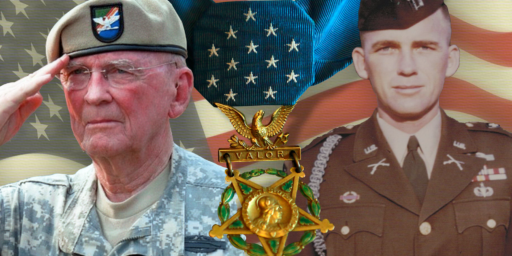Too Fat to Fight?
 Remember the recent flap over the retired generals fighting to for school lunch reform, arguing that our kids are too fat to fat? Daniel Engber makes a persuasive case that they’re wrong.
Remember the recent flap over the retired generals fighting to for school lunch reform, arguing that our kids are too fat to fat? Daniel Engber makes a persuasive case that they’re wrong.
In addition to pointing out that the armed forces have easily met their recruiting goals the last few years, he points out that 1) fat people can be fit and that 2) the military throws out perfectly capable soldiers for being overweight, seemingly for aesthetic reasons.
Yet fat soldiers are sometimes given the boot for reasons that have nothing to do with their abilities in the field. According to military guidelines, even someone who’s fit as a fiddle can be drummed out of camp for having the wrong body dimensions. Consider that a young man who’s 6 feet tall must weigh less than 195 pounds, or have a body fat percentage below 26, in order to serve in the Army. (The other branches offer a bit more leeway: In the Coast Guard, for instance, he can weigh up to 233 pounds.) That’s true even if he excels on the U.S. Army’s Physical Fitness Test. The regulations are very clear on this point: Athletic prowess does not make up for cottage-cheese thighs. In fact, it’s listed as one of the “typical excuses” that fatso soldiers should avoid: “I can pass the APFT, so why lose weight?” When it comes to body fat, the regs declare that too much flab connotes, first of all, “a lack of personal discipline.” Another document suggests that it “detracts from soldierly appearance.” So excess weight isn’t just a health problem—it’s a personality flaw. Oh, and it makes you ugly.
I don’t want to suggest that the military discriminates against the thick-bodied alone. The high standards of appearance apply to skinny people, too. And short people. And tall people. (Forget Prussia’s army of giants: If you’re a man who’s over 6-foot6 or a woman over 6-foot, you can’t join the Marine Corps.) Those with severe, untreatable acne may also be excluded from military service, along with anyone with an insufficient number of teeth, extra fingers, or severe ingrown toenails. Some of these requirements seem to have more to do with keeping neat and trim than fighting off baddies in the desert. It doesn’t matter if you can do as many pushups as the next guy. Without the “self-discipline to maintain proper weight distribution and high standards of appearance,” you’re not welcome.
Let’s get this straight. The Army wants to enlist as many able-bodied soldiers as possible, yet it treats anyone who’s fat as if they have some fundamental defect. According to the report, hundreds of first-term enlistees are discharged every year for being unable to control their weight. (The retired generals blame this rate of attrition for $60 million in additional training costs.) But discipline isn’t the problem. For these oversized soldiers, not even the hyper-controlled environment of an Army barracks—and the motivational tactics of the nation’s drill sergeants—can provide for lasting weight loss. The “Military Leaders for Kids” get the picture: Diet and exercise don’t work over the long term. That’s why they’re pushing a structural fix for obesity, school lunch reform. If it’s not about self-control, then what’s the problem here? Are we really too fat to fight?
We had a couple of guys in my ROTC class who were both shortish and barrel chested. Both excelled in the training. Neither were commissioned. They just couldn’t meet the height-weight standards.
Even more infuriating was the large number of perfectly good soldiers we threw out while I was on active duty simply on the basis of weight. Particularly affected were mechanics. Their schedules were nightmarish, as vehicles frequently went down and, the Army being the Army, the policy was that the vehicle crew and the mechanics would stay as late as they had to to get the work done. Even — as was usually the case — when we knew that a stopping point would come because a needed part wasn’t in and the job wouldn’t get finished until the next day, anyway. So, the guys would work late into the night, munch on some pizza, and go to bed late. They’d be authorized to skip morning PT since, after all, we didn’t want them doing dangerous work on two hour’s sleep. Eventually, this lifestyle caught up to them.
Beyond that, an increasing number of military jobs involve nothing more physically demanding than sitting behind a computer and moving a mouse. But people in these slots are held to the same fitness and weight standards as infantrymen. It’s pretty inefficient.
Engber’s right: The policy isn’t based on being fit enough to fight. Or, at least, it’s based on more than that. Part of the military esprit de corp is about self-image as warriors. And fatties and slobs don’t fit it.





Maybe part of the problem can be found in this: http://www.americanthinker.com/2010/04/taxes_arent_the_problem.html
Its kind of odd that a good portion of professional athletes (half the NHL and most Olympic decathletes for instance) wouldn’t be considered fit enough for the army using the height-weight standard … but it just goes to show that the military really is just another arm of the gov’t, and has the same bizarre bureaucracy.
That’s the problem with “standards” whether in govt or elsewhere. I know the example is extreme here, but it’s not really any different that Hitler setting the human “standard” at blond hair & blue eyes. Standards are absurd when not all variables have been taken into account. Standards are based on opinion, not fact. Measuring people by standards of any sort (apart form God’s standard) is about as mindless as humans get.
Lookism in the military is a major reason for the requirements. Which is actually a big part of the drive against obesity as well. (check out the banned Lane Bryant ad linked in Gone Hollywood). And really how fit does a kid need to be to fly an AUV?
The generals’ comments have a youth as asset of the state vibe more associated with less free societies. All the more obvious when you realize some of our greatest heros, such as Audie Murphy, did not meet the lookism standards of the military.
My father found out in Dec. ’41 why the government was so generous to pay for flight lessons. When he went in for his physical, they almost didn’t pass him because one of his big toe nails was discolored and very thick. He went in, became a Navy fighter pilot, won 3 air medals for shooting down three planes, a flying cross for sinking a ship loaded with Japanese soldiers and rose to Lt. Cmdr. 40+ years later they cut the nail way back, fed him anti-biotics for 6 months and the nail came back in normal.
The marines have an ‘every marine a rifleman’ mantra, so I can understand that better. I read once that the army did a study and found that it was cheaper to have helmets custom made for the top 5% large heads than stock them, so I can understand the idea of trying to stay within standard ranges. But some leeway is needed based on job required.
This does raise the question of when the military was waving some standard like tattoos, education, etc. Was the weight waved?
BTW, when I did my Navy physical I was within 6 oz of being failed and had to seek a special “10% variance” exception. I was 6’4″ and ~136 lbs.
Don’t folks in the military brass ever watch boxing or ultimate fighting? Put a guy who’s ripped with washboard abs vs. a guy the same size with a little extra fat and the latter wins almost every time. If I don’t know anything about the fighters, I *always* bet on the one with the gut.
The Air Force is a victim of this, I think. Five years or so ago, new fitness standards were introduced that were rather more…vigorous than before. Hardcore BMI measurement and a points system emphasizing running and push ups, real military stuff….except now, on their eval, it’s worse for an airman to fail their PT than to get a DUI. This is great for the fighter pilots who run the air force, but those of us who are basically office workers really took it hard to the knees.
I had the option myself of getting out, so I took it and went civilian for another agency…I see this a lot, actually, and while I think it tends to preserve expertise, I think that it enforces a culture within the service that is non conducive to intellectual fields.
Of course, it also tends to make the civilian government workforce hugely skeptical of the military’s ability to do anything…
Physical activity helps the brain function better.